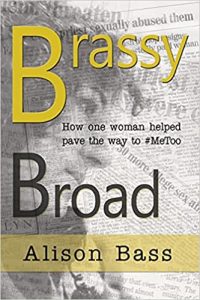Excerpt of Brassy Broad: How one Journalist Helped Pave the way to #MeToo
 This is an excerpt from the Prologue of my memoir, Brassy Broad: How one journalist helped pave the way to #MeToo, now available on Bookshop, Amazon and wherever books are sold. I wrote this memoir in part to understand why I, a woman from a comfortable middle-class background, became an investigative journalist who has repeatedly challenged the status quo. I think it had a lot to do with where I grew up, in an unusual intentional community founded by Quakers who resisted conventional norms.
This is an excerpt from the Prologue of my memoir, Brassy Broad: How one journalist helped pave the way to #MeToo, now available on Bookshop, Amazon and wherever books are sold. I wrote this memoir in part to understand why I, a woman from a comfortable middle-class background, became an investigative journalist who has repeatedly challenged the status quo. I think it had a lot to do with where I grew up, in an unusual intentional community founded by Quakers who resisted conventional norms.
WHEN THE PHONE on my desk rang shortly before 4 pm on May 7, 1992, I thought perhaps it was a callback for a story I was working on for the Boston Globe’s Health and Science section. But no, it was Eric MacLeish, an attorney who had been a key source on several previous stories I’d written about sexual abuse. The latest involved a male teacher who molested several boys at a prestigious, private school in Cambridge.
“You on deadline?” MacLeish asked.
“Not particularly, why?” I responded.
“Well, you are now,” he said. MacLeish proceeded to tell me that he was representing nine men and women who were accusing a former Roman Catholic priest of molesting them when they were children living in the Fall River-New Bedford area of Massachusetts more than twenty years ago. MacLeish said his clients were prepared to sue the Catholic Church if it did not compensate them for the damages they suffered at the hands of Father Porter, as the priest was known. They wanted him brought to justice.
Typing furiously, my phone cradled to one ear, I couldn’t believe what I was hearing. This was the first time anyone had gone public with specific accusations of priest sexual abuse in the Boston Globe’s catchment area.
“Wow,” I said. “Any chance I could talk to some of the victims?”
MacLeish chuckled. “As a matter of fact, I have one sitting right next to me now.”
Another voice came on the line. “I’m Frank Fitzpatrick. How can I help you?”
Fitzpatrick, a forty-two-year-old private investigator in Rhode Island, told me that he recalled an incident with Father Porter in the early sixties when he was ten or eleven. The priest, then in his late twenties, had taken him to a ballgame and to Porter’s parents’ house in Revere.
“He gave me some mincemeat pie and it had something in it that knocked me out and then he raped me,” Fitzpatrick said in a flat voice. “I repressed it entirely until a little over two years ago, when the memories started coming back.”
Fitzpatrick wasn’t the only victim who talked to me that afternoon. I also interviewed by phone a thirty-seven-year-old New Bedford man named Joe who had been hospitalized for depression and panic disorder. Joe said Father Porter molested him on three separate occasions when he was twelve. One time, the priest sexually assaulted him in his own home after asking his parents if he could go into Joe’s bedroom to talk to him.
As soon as I got off the phone with Joe, I speed walked to the office of my editor, Nils Bruzelius, whom I respected, and filled him in. Nils’ eyebrows shot up.
“This is a great story Bass,” he said. “Get it to me as soon as you can; Metro is going to be all over this one.”
Reading the Globe at home the next morning, I saw that the Father Porter story had run in the Metro section. But when I got to work, there were no messages of praise from the top editors waiting for me. Instead, they seemed stunned by the allegations. On previous occasions when I had broken particularly newsworthy stories, I would sometimes receive congratulatory notes from the big guns. But this time, there was only silence.
When I first arrived at the Boston Globe in 1987, Jewish reporters there were relatively scarce, and scarcer still were Jewish editors and managers. So when I broke the Father Porter story and proceeded to write several more articles about other victims of Father Porter, I felt distinctly uncomfortable, as though there was a bullseye on my back. Here I was, a Jew writing about the Catholic Church, which for decades in Boston had been an institution the newspaper did not take on lightly, if at all. In journalistic parlance, the Church was known as “a sacred cow” and up till then had been treated with kid gloves by the Globe’s top editors.
The cow was no longer sacred. By mid-May, other reporters had joined me in reporting on various aspects of the Father Porter story. In retrospect, I think top Church officials in Boston were caught by surprise at our aggressive reporting on the Father Porter case. That might explain why Law castigated the news media, and the Boston Globe in particular, for what he considered sensationalistic coverage of the case. At an antiviolence march in Boston May 23, 1992, Law said, “The papers like to focus on the faults of a few . . . We deplore that. By all means we call down God’s power on the media, particularly the Globe.”
Reading those words in the paper the next day, I felt a shiver run down my spine. I don’t know whether Law knew that none of the reporters currently covering the Father Porter story were Catholic but there was no question he was sending a strong message to the paper’s editors, many of whom were Catholic: back off or be forever damned. Since I didn’t believe in a vengeful Christian God, I wasn’t worried about my soul. I was, however, concerned about my standing at the paper. As a Jew covering the Father Porter story, was I sabotaging my career at the Globe?
—
Alison Bass is an award-winning journalist and the author of three nonfiction books: Side Effects: A Prosecutor, a Whistleblower and a Bestselling Antidepressant on Trial; Getting Screwed, Sex Workers and the Law; and Brassy Broad: How one journalist helped pave the way to #MeToo. Side Effects received the prestigious National Association of Science Writers’ Science in Society Award and its film rights were optioned. Bass recently retired as Associate Professor of Journalism at West Virginia University.
She was a long-time staff writer for The Boston Globe and a series she wrote for The Globe was nominated for a Pulitzer Prize in the Public Service category. Her articles and essays have also appeared in The Los Angeles Times, Buzzfeed, The Village Voice, Psychology Today, and numerous other media. For more on her credentials, please visit her website at www.alison-bass.com.
Brassy Broad: How One Journalist Helped Pave the Way to #MeToo
 Alison Bass learned as a child to challenge the status quo. As an adult, she not only challenged, but smashed it as a scrappy outlier, establishing herself as a respected, award-winning investigative journalist in a male-dominated industry.
Alison Bass learned as a child to challenge the status quo. As an adult, she not only challenged, but smashed it as a scrappy outlier, establishing herself as a respected, award-winning investigative journalist in a male-dominated industry.
Bass grew up in Bryn Gweled, Pennsylvania, an unusual cooperative community founded by Quakers, where she gained a unique view of the world that compelled her to question everything but also be empathetic and open-minded about the answers she uncovered. The perfect combination for an investigative journalist. In 1989, Bass was the first reporter in the nation to write about how common it was for male psychiatrists to sexually abuse female patients. She was also the first reporter at The Boston Globe to write about the molestation of children by Catholic priests-a decade ahead of the Spotlight investigation chronicled in the 2016 movie that won the Academy Award for Best Picture.
Despite her success, Bass alienated her bosses with her assertive reporting style and refusal to take “no” for an answer. Editors at The Miami Herald in the early 1980s didn’t know what to do with a “brassy northern broad.” At The Boston Globe, she was denied a berth on the Spotlight team because she was considered too independent-minded for a woman.
Alison Bass’ story is much more than how a sassy outsider became an investigative journalist despite the odds against her. Her perseverance in chipping away at the wall of male bias in how female victims are treated in the media helped pave the way to the #MeToo movement.
BUY HERE
Category: On Writing
























